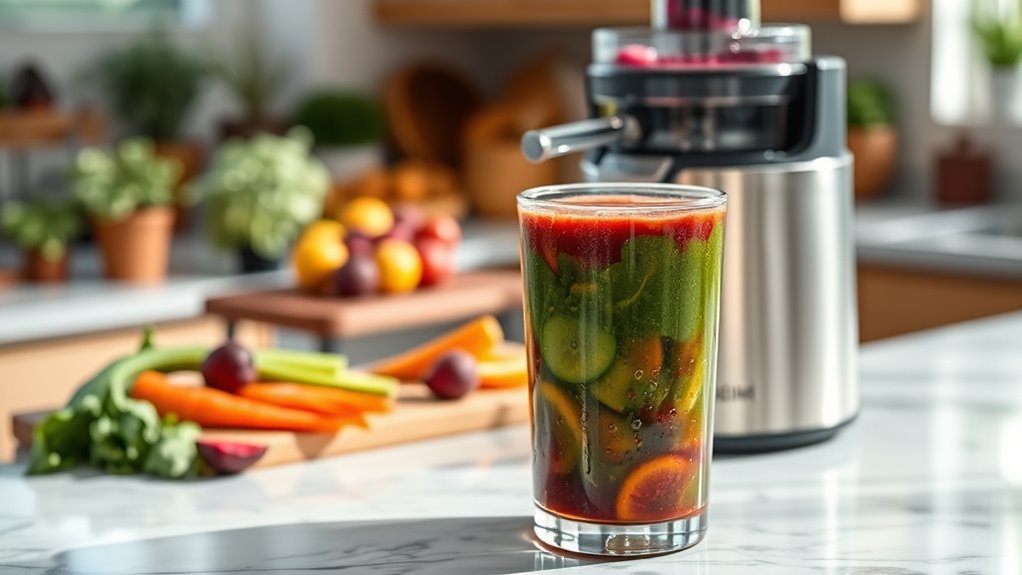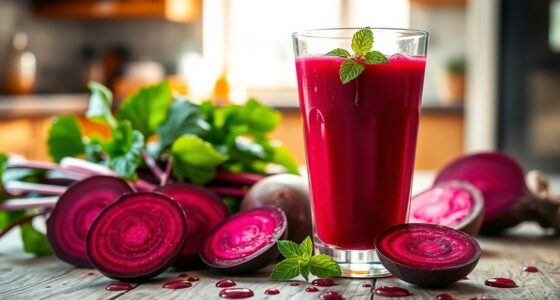Juicing can seriously boost your brain function! By incorporating nutrient-rich juices like blueberry, orange, and pomegranate, you can enhance your cognitive health. These juices are packed with antioxidants that fight oxidative stress and improve memory. Plus, regular consumption may even lower the risk of Alzheimer’s. However, it’s important to balance juicing with whole foods for ideal fiber intake. Want to discover more about the brain-boosting benefits and delicious recipes? Keep exploring!
Key Takeaways
- Juicing, particularly with fruits like blueberries and oranges, can enhance cognitive health and improve memory performance.
- Consuming juice regularly may significantly lower the risk of Alzheimer’s disease in older adults by up to 76%.
- Antioxidants found in juices, such as polyphenols in pomegranate and blueberry, combat cognitive decline and support brain function.
- Beetroot juice increases blood flow to the brain, enhancing overall cognitive performance and sharpness.
- Juicing should complement a balanced diet, as whole fruits provide essential fiber and additional nutrients that juices lack.
The Science Behind Juicing and Brain Function
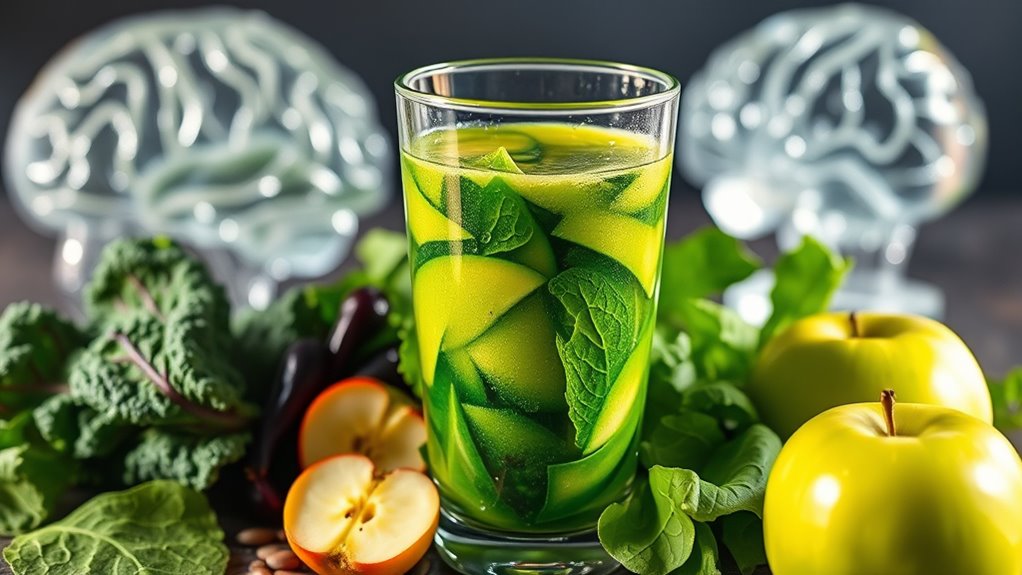
When you consider the impact of diet on cognitive health, juicing emerges as a fascinating topic. Research indicates that drinking juice, particularly from fruits like oranges and blueberries, can notably enhance cognitive function.
For healthy older adults, consuming fruit and vegetable juice three times a week may lower the risk of developing Alzheimer’s disease by 76%. Studies have shown that blueberry juice improves working memory, while pomegranate juice, packed with antioxidants, boosts memory performance after daily intake. Additionally, incorporating green juice into your diet may provide essential nutrients that support overall brain health.
Although these juices show promise in supporting brain health, it’s essential to remember that whole fruits offer additional fiber and health benefits. Balancing juice consumption with whole fruits might be the best approach for maintaining cognitive vitality as you age.
Nutrient-Rich Juices for Cognitive Health
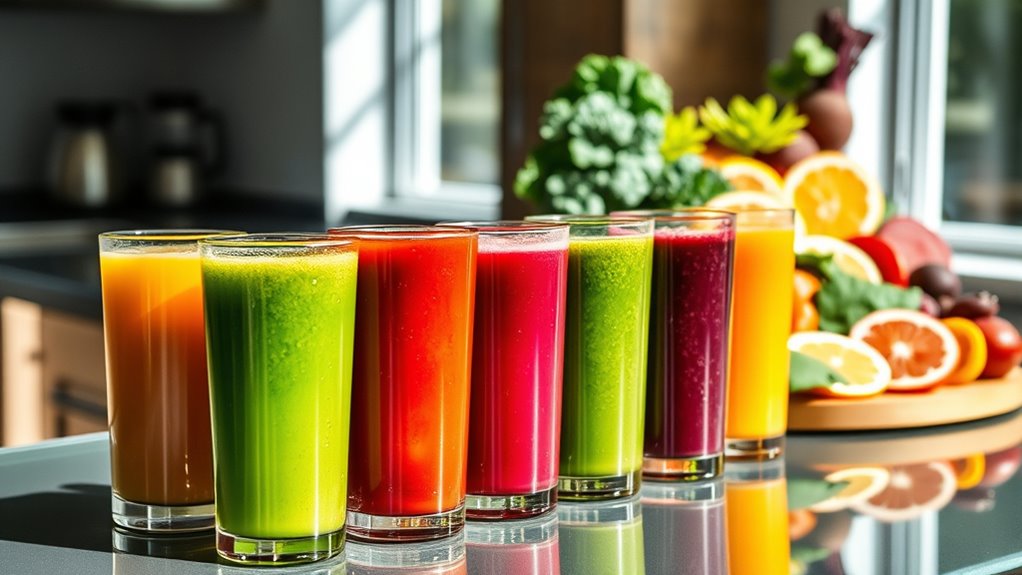
If you’re looking to boost your brain health, incorporating nutrient-rich juices into your diet can be a game changer.
Juices like orange juice, packed with vitamin C and flavonoids, can lower your risk of cognitive decline and enhance brain function.
Orange juice, rich in vitamin C and flavonoids, may reduce cognitive decline and boost brain health.
Blueberry juice, rich in anthocyanins, may improve working memory after just 90 days of consistent consumption.
Pomegranate juice offers powerful antioxidants that can boost memory performance with only 8 oz daily.
Beetroot juice increases blood flow to your brain, potentially sharpening cognitive function and reaction times.
Finally, grape juice, filled with flavonoids, can reduce brain inflammation and promote neurogenesis, supporting new brain cell creation and strengthening cognitive connections—especially beneficial for older adults facing neurodegenerative diseases.
Additionally, incorporating unique homemade fruit juice recipes can provide a variety of nutrients that further support cognitive health.
The Role of Antioxidants in Brain Vitality
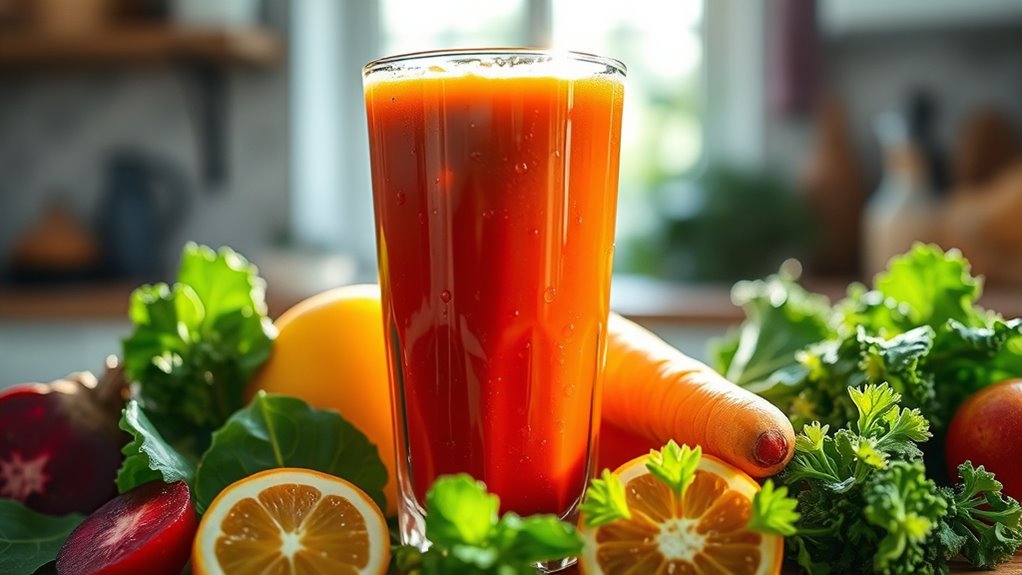
Antioxidants play an essential role in maintaining brain health by neutralizing free radicals that can harm brain cells and accelerate cognitive decline.
By incorporating juice consumption of antioxidant-rich beverages, like blueberry or pomegranate juice, you can markedly boost your cognitive function. Polyphenols found in these juices have been shown to improve memory and slow cognitive decline, especially in aging populations.
Regularly drinking juices, such as orange juice, may lower your risk of developing neurodegenerative diseases like Alzheimer’s. Additionally, the health benefits of juice cleansing in providing concentrated sources of nutrients can further support overall brain vitality.
Furthermore, the antioxidants in green tea, particularly EGCG, can enhance brain health by potentially improving cognitive performance and mood.
Juicing vs. Whole Foods: What’s the Difference?
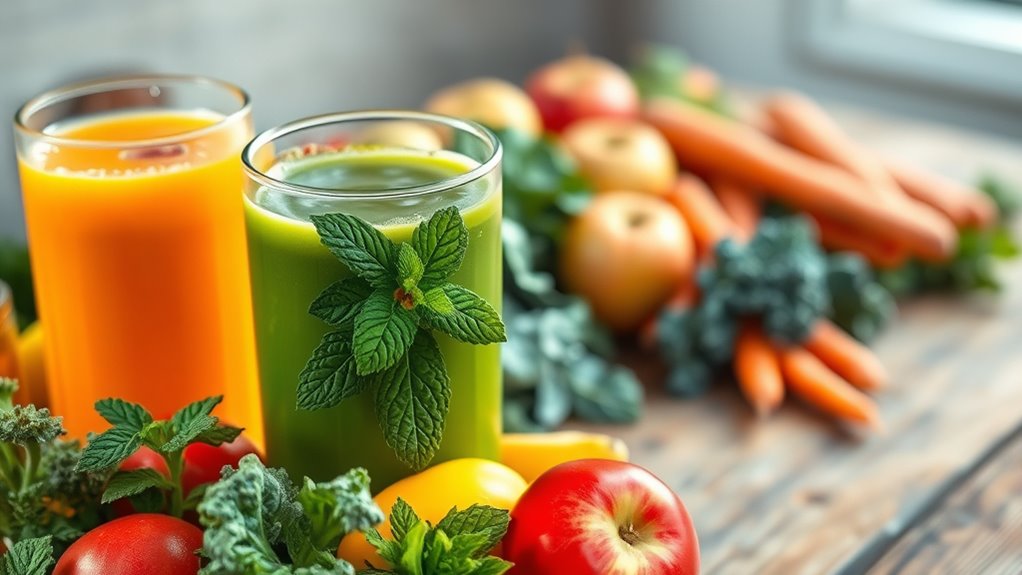
When you choose between juicing and whole foods, consider how each option impacts your nutrient intake.
Juicing strips away essential fiber, which plays a vital role in digestive health and nutrient absorption.
Whole fruits and veggies, on the other hand, offer a fuller range of nutrients and benefits that juicing simply can’t match.
Nutrient Retention Comparison
While juicing might seem like a quick way to boost your nutrient intake, it often comes at the cost of essential fiber and polyphenols found in whole fruits and vegetables.
These nutrients are crucial for gut health and cognitive function. Whole fruits provide fiber that aids digestion and stabilizes blood sugar levels, enhancing nutrient absorption.
Juices, on the other hand, don’t offer significant absorption benefits compared to whole produce, which means you might be better off skipping the juice.
Research shows juice can even lead to gut inflammation and promote harmful bacteria, ultimately impacting your cognitive health.
Instead, consider smoothies, which retain both fiber and nutrients, ensuring you enjoy the cognitive benefits of whole fruits and veggies. Additionally, incorporating chia seeds into your smoothies can further enhance the omega-3 content, supporting brain health.
Fiber Content Importance
Although you might enjoy the taste of fresh juice, understanding the importance of fiber content can greatly impact your health. Juicing removes the valuable fiber found in whole fruits and vegetables, which is essential for digestive health.
This fiber not only helps maintain a feeling of fullness but also supports gut health by reducing inflammation. When you skip fiber, you miss out on butyrate production, a short-chain fatty acid linked to cognitive health. Additionally, juices like beet juice may enhance blood flow and support overall brain function, highlighting the importance of a balanced approach to nutrient intake.
Research shows that high-fiber diets lead to better overall health outcomes, while juicing may not deliver the same benefits. Instead, consider smoothies, which retain fiber and nutrients, ensuring you still incorporate fruits and vegetables into your diet for ideal gut and brain health.
Popular Juices That May Enhance Memory
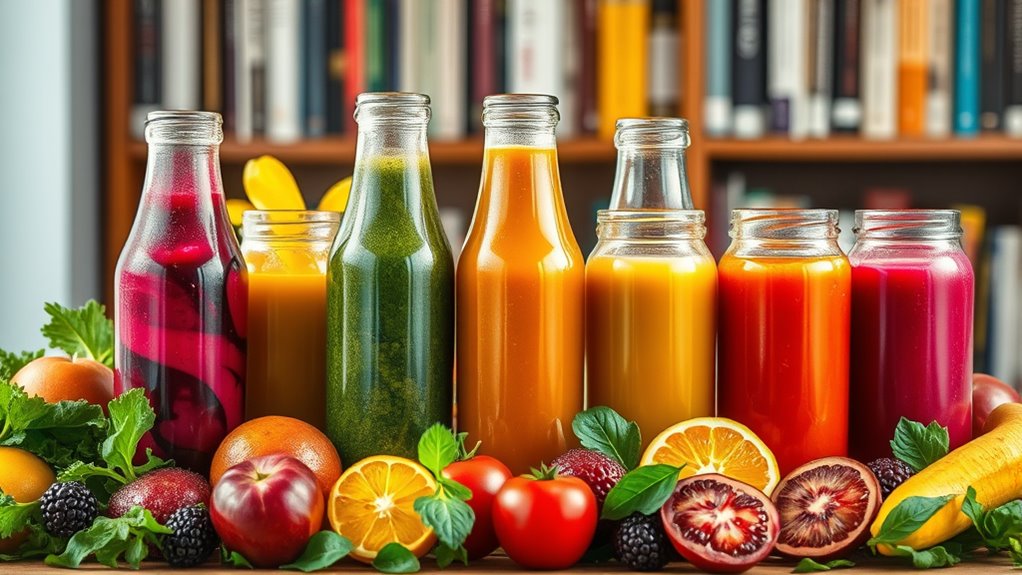
When it comes to boosting your memory, certain juices stand out for their nutrient-rich profiles.
Blueberry, pomegranate, and orange juices are just a few examples that can enhance cognitive function.
While whole fruits offer fiber and other benefits, these juices provide concentrated nutrients that can support your brain health. Additionally, juices like parsley juice, which is rich in vitamins, may provide additional cognitive benefits due to its high nutrient content.
Nutrient-Rich Juices
If you’re looking to boost your brain function, incorporating nutrient-rich juices into your diet might be a game changer.
These juices can help improve cognitive function and enhance memory. Here are three you should consider:
- Blueberry Juice: Known for its memory-enhancing properties, studies show it can improve cognitive function in older adults over 90 days.
- Pomegranate Juice: Packed with antioxidants, it’s been linked to significant memory performance improvements, shielding your brain from cognitive decline.
- Beetroot Juice: High in nitrates, it boosts blood flow and oxygen delivery to the brain, which may enhance reaction time.
Adding these nutrient-rich juices into your daily routine can help you maintain mental sharpness and overall brain health.
Whole Fruits Advantage
While nutrient-rich juices can certainly provide cognitive benefits, don’t underestimate the advantages of consuming whole fruits. Whole fruits like blueberries are packed with anthocyanins that can greatly improve memory and cognitive performance, especially in older adults.
Pomegranate juice is great, but munching on whole apples offers more fiber and nutrients that contribute to better health outcomes. Plus, regular consumption of orange juice, rich in vitamin C, can lower your risk of cognitive decline compared to sugary drinks.
Blueberry juice has its perks, but whole berries may provide even greater cognitive advantages. By incorporating whole fruits into your diet, you’re not just boosting brain function; you’re reaping a multitude of health benefits that enhance your overall well-being. Additionally, raw foods may have higher enzyme content beneficial for digestion, further supporting optimal nutrient absorption.
The Gut-Brain Connection: How Juicing Affects Cognition
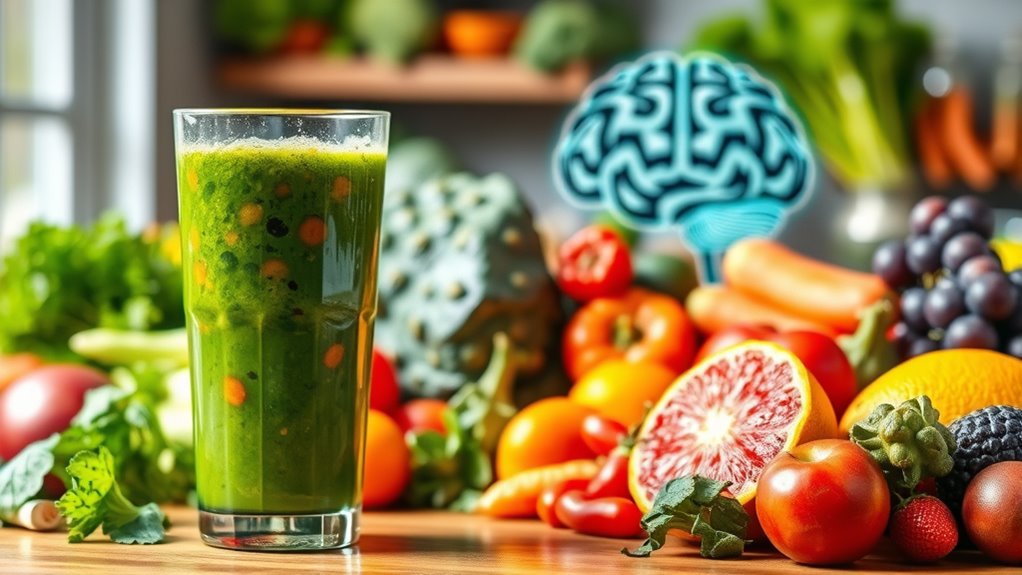
Juicing has a significant impact on your gut microbiota, which in turn can influence brain function through the gut-brain axis.
Here’s how juice consumption can enhance cognitive function and overall brain health:
- Antioxidants: Juices high in antioxidants, like pomegranate and blueberry, support memory performance and cognitive function, especially in older adults.
- Lower Risk of Neurodegenerative Diseases: Research shows juice drinkers have a 76% lower risk of developing Alzheimer’s compared to non-drinkers.
- Probiotics: Certain juices may contain probiotics that promote healthy gut bacteria, positively affecting brain health.
- Coffee’s Antioxidants: Additionally, juices combined with coffee can further enhance antioxidant levels, which are known to combat oxidative stress and support brain function.
Potential Risks of a Juice-Only Diet
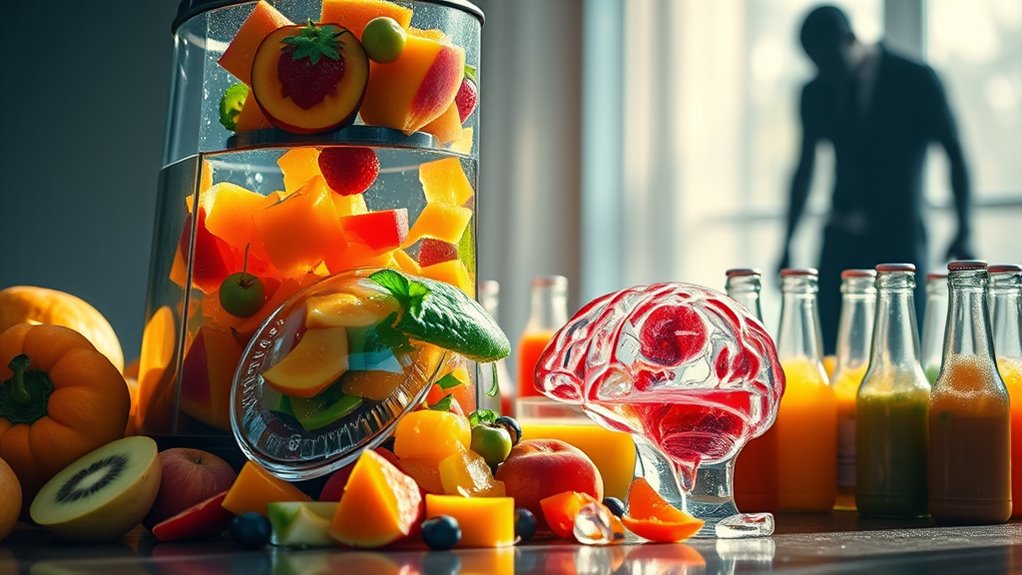
Although a juice-only diet may seem like a quick way to detox and boost health, it comes with several potential risks that shouldn’t be ignored.
One major concern is the significant reduction in fiber intake, which is necessary for digestive health and can lead to gut inflammation. Additionally, juicing often strips away polyphenols and beneficial compounds important for maintaining a healthy gut microbiota and preventing cognitive decline.
Research shows that a juice diet may promote sugar-loving bacteria, increasing the risk of a “leaky gut,” negatively impacting brain health. Furthermore, juice cleanses typically lack essential nutrients found in whole foods, leading to nutritional risks over time and potentially disrupting the gut-brain axis, which is critical for ideal cognitive function. Moreover, essential oils can offer natural antimicrobial properties that may support gut health when used appropriately.
Delicious Juicing Recipes for Brain Boosting
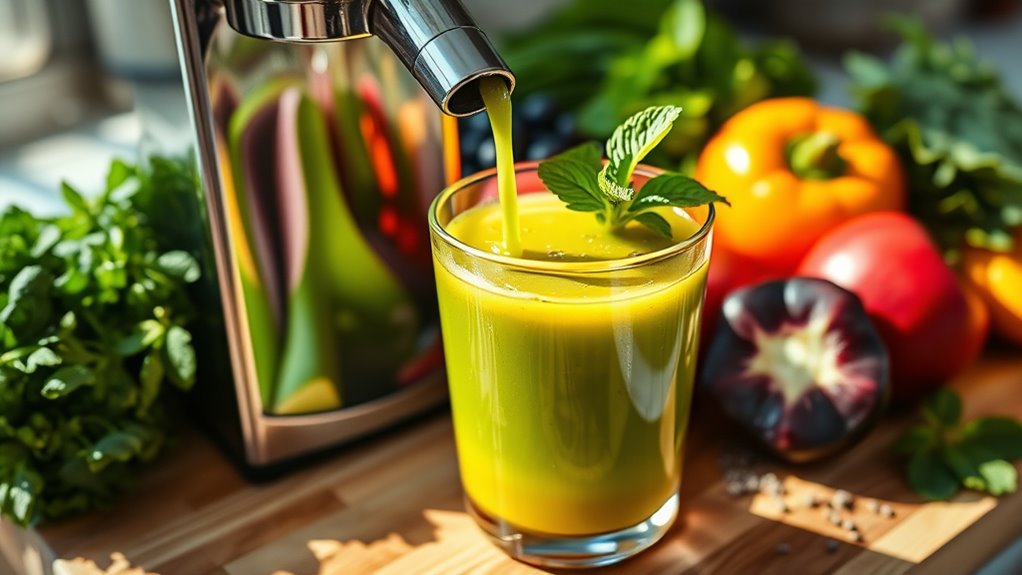
If you’re looking to give your brain a boost, incorporating delicious juicing recipes into your diet can be an exciting and nutritious way to do so.
These juices aren’t only tasty but also packed with nutrients that improve brain function. Here are three brain-boosting juicing recipes to try:
Discover delicious juices that not only tantalize your taste buds but also enhance brain function with essential nutrients.
- Blueberry & Spinach Juice: Blend fresh blueberries and spinach; the juice is rich in antioxidants that support improved cognitive function.
- Orange & Beet Juice: Combine orange juice with beetroot; this healthy plant mix enhances blood flow to your brain.
- Pomegranate & Kale Juice: Juice pomegranate and kale for a revitalizing drink that’s loaded with polyphenols to boost your brain.
Incorporating these fruits and veggies into your routine can lead to noticeable benefits!
Making Informed Choices: Juicing in a Balanced Diet
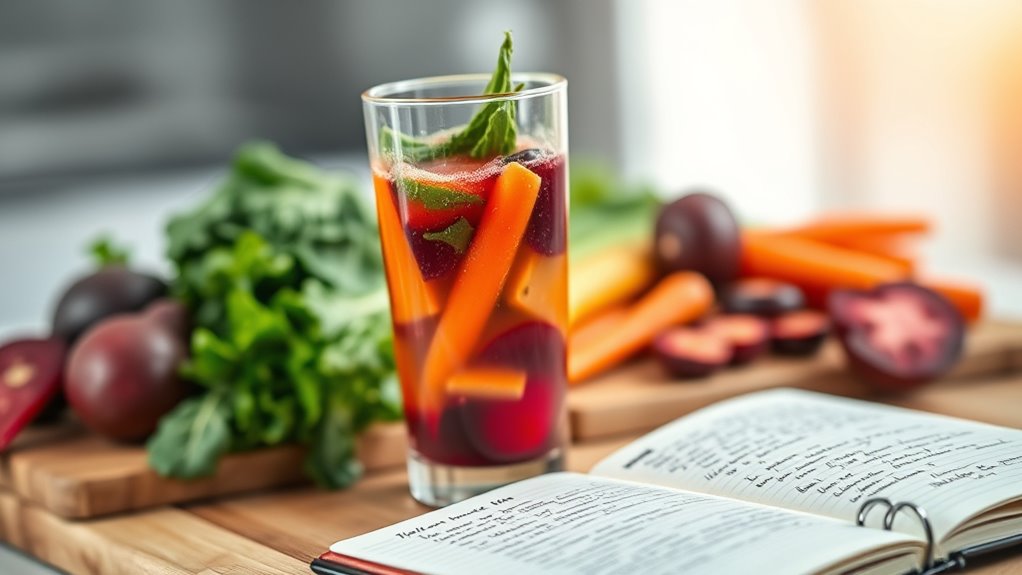
When considering how to incorporate juicing into your diet, it’s vital to recognize that it should complement a balanced approach rather than act as a substitute.
While juicing can help you consume more fruits and vegetables, whole fruits offer essential fiber and greater health benefits.
Scientific evidence suggests that blending fruits and veggies retains more nutrients than traditional juicing methods, making smoothies a healthier option.
Juice cleanses, consisting only of juices, are generally not recommended due to insufficient nutrition.
Freshly made juice is best consumed immediately to avoid bacterial growth, while commercially prepared options should be pasteurized for safety. Additionally, incorporating ingredients like chia seeds into smoothies can enhance their nutritional profile and provide added health benefits.
Frequently Asked Questions
Is Juicing Good for the Brain?
Juicing can be good for your brain, but it’s not a guaranteed fix. You might find that certain juices, like orange or blueberry, help improve cognitive function and memory.
However, it’s important to remember that whole fruits provide more fiber and nutrients, which are beneficial for overall brain health.
While juicing offers some advantages, relying solely on it may not be the best approach for enhancing your cognitive abilities. Balance is key!
What Can I Drink to Improve My Brain Function?
Imagine your brain as a garden; what you drink nourishes its growth. To improve your brain function, consider sipping on juices like blueberry, pomegranate, or beetroot.
Blueberry juice can enhance your working memory, while pomegranate juice boosts memory performance with just 8 ounces.
Green tea, packed with antioxidants, sharpens cognitive skills.
Which Juice Is Best for the Brain?
When it comes to choosing the best juice for your brain, consider options like orange juice for its vitamin C and flavonoids, which support cognitive health.
Blueberry juice is fantastic for memory enhancement, especially with consistent consumption.
Don’t overlook pomegranate juice, rich in antioxidants, or beetroot juice, known for improving blood flow to the brain.
Grape juice can also help by reducing inflammation and promoting new brain cell growth.
Each offers unique benefits!
What Is the Best Natural Brain Booster?
When you’re looking for the best natural brain booster, consider incorporating juices rich in polyphenols into your diet.
Blueberry juice can enhance your memory, while pomegranate juice offers strong antioxidant benefits that support cognitive function.
Don’t overlook orange juice, either—it’s linked to a considerably lower risk of Alzheimer’s disease.
While whole fruits are great for fiber, these juices provide unique advantages that can help keep your brain sharp and healthy.
Conclusion
Incorporating nutrient-rich juices into your diet can truly enhance your brain function and overall cognitive health. Just imagine a busy professional like Sarah, who starts her day with a vibrant green juice packed with spinach and avocado. Within weeks, she notices improved focus and memory during meetings. By making informed choices and blending juices with whole foods, you can unleash your brain’s full potential, creating a healthier, sharper you. So, why not give it a try? Your mind will thank you!
Cindy thoroughly researches juicing trends, techniques, and recipes to provide readers with practical advice and inspiration. Her writing style is accessible, engaging, and designed to make complex concepts easy to understand. Cindy’s dedication to promoting the advantages of juicing shines through her work, empowering readers to make positive changes in their lives through the simple act of juicing.

